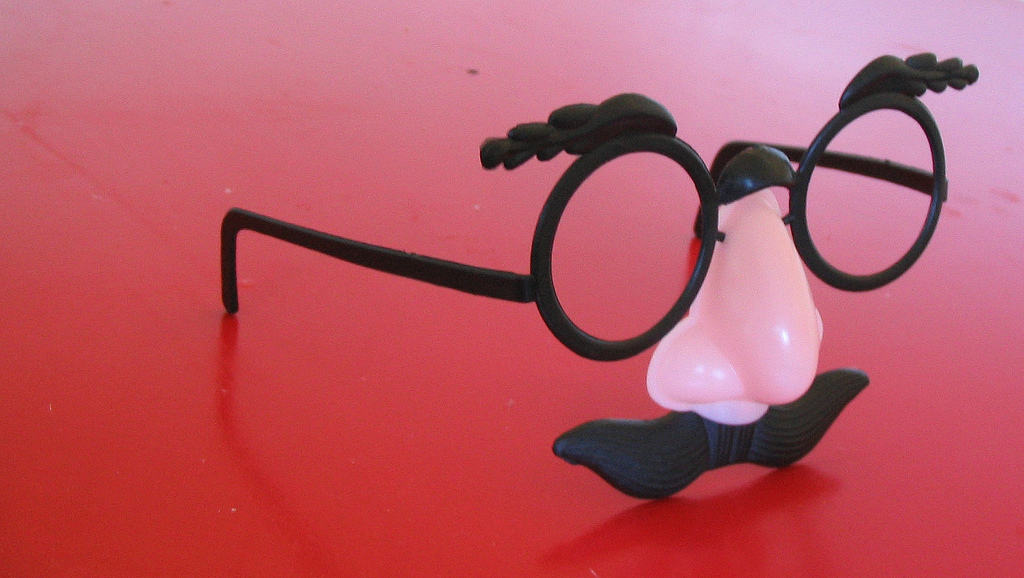“God Hates Comedy Musicians.”
Or so goes the refrain to a raunchy but funny song by Cirque du So What (don’t read the rest of the lyrics if you’re easily offended). The song describes how comedy musicians suffer from having a small fan base while lamenting that “all of our songs wind up on various file-sharing programs with misspelled titles, credited to Weird Al.” Yes, I count myself as one of the few (not necessarily proud) fans of comedy (AKA novelty, demented, parody, spoof, funny, filk) music.
Hopefully my 1800 plus comedy songs on iTunes are correctly ID’d.
***
I became hooked on novelty tunes as a child listening to Dr. Demento. Unfortunately, his radio show rides few airwaves today, although thanks to the Internet, I can get my fix listening to Dementia radio, TheFUMP, Mad Music Archive and the Funzone. In some ways, we live in the golden age of comedy songs.
Most music connoisseurs (except perhaps this TJP editor) turn up their noses (ears?) at such music, but I love it for at least eight reasons:
- Diversity: I love the ridiculous spectrum of topics that novelty songs cover. Lady Gaga and friends don’t usually sing about Doctor Who, parasites, dumpster diving or cosplay.
- Humor: Laughter helps us get along. Ask anyone who lives in community or has been to a family reunion, and they will probably relate to Paul Thorn’s humorous I Don’t Like Half The Folks I Love. And religious life has always enjoyed a tradition of laughter. (See, for example, James Martin’s latest book as well as Jake Martin’s recently published What’s So Funny About Faith.)
- History: Folks today still the same Banana Oil that Vaughn DeLeath sang about back in 1925. And if the consumerism of Christmas depresses you, listen to Stan Freberg’s Green Chri$tma$, which could have been written today instead of 1958.
- Clever lyrics: The quintessential Ignatian novelty song, God is In by Billy Jonas lists the various places where God can be found. It boasts such clever lyrics as: “God is in your old jalopy, makes it go when it should not be,” “God is in the ozone layer; holier and holier,” and (spoiler alert) “God is in the atheist, saying ‘yeah, I don’t exist’.”
- Thought-provoking: Everything I need to know about philosophical arguments I learned by listening to Flanders and Swann’s The Reluctant Cannibal.
- Fun: The classic Fish Heads by Barnes and Barnes even makes singing about “rolly polly fish heads” cool.
- Democratic: Thanks to GarageBand and the internet, anyone can record and post a novelty song. Students I know have sung about cake and finding a job.
- Therapy: These fun songs keep me awake on long drives. It’s also impossible to be depressed while listening to them. To parody a Clinton Gregory song, if it weren’t for crazy music, I’d go crazy.
Speaking of which, it’s likely that my predilection for novelty songs has give me a… somewhat skewed perspective on life. On one hand, this skewed perspective has ruined television for me. A tendency to immediately mentally spoof any show that takes itself too seriously will do that. But it’s not all bad either. The skewed perspective of novelty songs has helped me see life differently. Sometimes things that our culture paints in black and white start to look purple and gold after a comedy song immersion. This especially holds true for theological issues. Or a-theological issues, as the case may be.
***
It’s no surprise that atheism has received a lot of coverage lately in TJP (see posts by my brothers Ryan, Vinny and Sam). Indeed, ever since Pope Paul VI asked us, Jesuits have taken a special interest in atheism (you can turn to another brother of mine, Tony, if you’re interested in what Paul VI asked us to do and why).
Taking my cue from comedy musicians, I’d like to skew the atheism discussion just a bit by asking, “Who is the atheist”? I hope to do what comedy songs do: turn assumptions and mis-conceptions on their head and thus break down the rancorous “us versus them” mentality we sometimes see characterize this debate. I want to show two things: (1) that non-belief (much like belief) defies easy classification, and (2) that atheists deserve the Christian love and understanding that Jesus extends to all minorities and all the marginalized.
***
An atheist, by definition, does not believe in God. This definition provides a theoretical understanding of the atheist, but it falls short when we actually look at the lived, everyday experience of the atheist. Many atheists, perhaps fearing stigmatization, prefer to describe themselves as secular humanists, seekers or agnostics (those who neither believe nor disbelieve in God). Some agnostics believe that they represent a more intellectually honest philosophy, yet Christianity is not a philosophy, it’s a way of life. This is a problem for agnostics (although not for atheists), because, when the rubber hits the road, an agnostic must get off the fence and choose to live a life that reflects the reality (or non-reality) of God. Thus, the precise, clean philosophical distinction between atheist and agnostic becomes blurred in the lived experience of life.
Some atheists feel uncomfortable defining themselves as non-believers, non-theists, and have even proposed using the term “brights” as a replacement. The sociologist Phil Zuckerman prefers to describe himself with the more positive term, aweist, which he feels convey his feelings of deep joy, amazement and awe at the world.1
Historically speaking, the label “atheist” referred to those who lacked “right” belief, such as the famous Jewish philosopher Baruch Spinoza.2 Atheism also implies that all religions are theistic, but this is not true for many religions such as certain strains of Buddhism and paganism. To further complicate our definition, ask an atheist to describe the kind of God they don’t believe in. All of these complicate the picture. So how can we get a grasp on it?
Many people suggest looking at the data, or taking a survey. But quantifying atheists in surveys shows the difficulty in attempts to neatly classify a person’s belief (or non-belief) system. Even more, as a stigmatized group, under-reporting may occur as a result of the “social desirability effect” in which respondents are reluctant “to provide what they deem to be unpopular answers to certain questions.”3 A simple survey often fails to distinguish atheist from agnostic even when the questionnaire allows for a free response. For example, I know someone who identifies as atheist because she is certain God does not exist. But she also identifies as agnostic because she cannot explain the existence of the universe and how it may have been created. We all know people like this (heck, some of us may be people like this).
We find similar confusions if we wander into the equally mixed world of those who do believe in God. There we see that people vary widely according to the kind of God they believe in. Some profess belief in a personal deity, while others describe their God as impersonal or simply as a force. These believers also vary widely in their certainty of God’s existence, ranging from absolutely certain, to unsure, to “I don’t know.” Many genuine believers identify with no religious institutions, preferring the term “spiritual” instead.
This ambivalence also extends to believers who identify with more than one faith tradition. A believer once explained to me that he practices multiple religions because well… he wanted to hedge his bets. And don’t we all know professed believers whose lives show that God does not exist? Some Christians believe in God in the way that Homer Simpson believes in exercise: it’s a good idea, but it’s not for them. On the flip side, we may know many atheists and agnostics whose edifying lifestyles would shame many self-described Christians.
As an evolutionary biologist, I have met many atheists who are really nice folks and I count them among my friends. Few are like Richard Dawkins as caricatured here. However, these more aggressive and extreme atheists (which also include Daniel Dennett, Sam Harris, and the late Christopher Hitchens) tend to make the headline news. I personally know a few of these “militant” atheists and their attitude makes it difficult for me to extend the love and compassion they deserve as children of God.
With the exception of these militant atheists, most atheists (like most believers) take a more nuanced approach to their non-belief. Philosopher Alain de Botton, for example, advocates using religious forms and traditions to satisfy the human need for ritual, connection, and transcendence while remaining atheist. (Perhaps he was inspired by Steve Martin’s humorous tune, Atheists Don’t Have No Songs.) Consider also the atheist and Humanist chaplain at Harvard, Greg Epstein, who wrote Good Without God: What a Billion Nonreligious People Do Believe.
But most people in the United States see only the militant atheist and classify atheism as a dangerous problem. Many Christians associate “atheist” with anti-Christian and anti-American. Compared to other minority groups, atheists are less likely to be accepted in American society. For example, a U.S. poll found that, in a hypothetical presidential election, Americans would cast their vote for a Catholic, Jewish, African American, and even a homosexual candidate before putting an atheist in the oval office.4 The same study showed that Americans ranked atheists at the top of those minorities (which included Muslims, homosexuals and recent immigrants) who do not agree at all with their vision of American society (see also a more recent survey).
Whether we like it or not, publicly identifying as an atheist in the United States often leads to stigmatization by family and friends. Such discrimination hinders dialogue and increases polarization, making the task of finding common ground more difficult. As a Christian, I question whether such behavior is consistent with Jesus – who loved the pagan Roman centurion enough to heal his servant (Luke 7: 1-10).
Simply put, God does not hate the atheist (or the comedy musician, for that matter). And if atheists and believers took the time to understand one another better, we might not do the same either.
***
I guess a post about parodies and atheism would not be complete without a parody of atheism.
Last November, the Oxford-style debate program, Intelligence Squared, hosted a debate that asked if the world would be better off without religion. In front of a live audience, two panelists argued in favor of the motion while two others argued against. After hearing about the dangers of believing in an irrational God and how many people have died in the name of religion, my mind went into parody mode. The following spoof took only a one-word substitution. Its ridiculousness sums up my own position in the debate far more succinctly than any argument I could write:
The world would be better off without Love.
Love is irrational.
People have lied, cheated and even killed in the name of Love.
Love is associated with diseases and poverty.
Science and technology can give us everything that Love used to give us.
— — — — —
- Zuckerman, Phil, “Aweism,” Free Inquiry, 29 (2009): 52-60 ↩
- MacCulloch, Diarmaid, Christianity: The First Three Thousand Years (New York: Penguin Group. Kindle Edition, 2009), p 745 ↩
- Baggett, Jerome, “Protagoras’s Assertion Revisited: American Atheism and Its Accompanying Obscurities,” Implicit Religion 14 (2011): 264 ↩
- Penny Edgell, et al., “Atheists as ‘Other’: Moral Boundaries and Cultural Membership in American Society,” American Sociological Review, 71 (2006): 215. ↩





